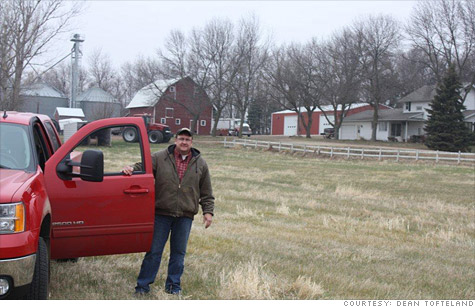Search News

MF Global customer Dean Tofteland raises corn, soybeans and pigs on his farm in Minnesota.
NEW YORK (CNNMoney) -- Luverne, Minnesota, is a long way from the Manhattan offices of MF Global, but the effects of the firm's bankruptcy are being felt acutely by some in this town of 4,600.
Take Dean Tofteland, a farmer who raises corn, soybeans and pigs. (MF Global: Sorting through the debacle.)
Tofteland said he has more than $200,000 locked up in an account with MF Global (MFGLQ), which has come under federal scrutiny amid reports that it may be missing more than $1.2 billion in customer funds.
While many on Wall Street used MF Global to speculate, Tofteland used it to protect his business from fluctuations in the price of what he sells.
He wasn't alone. In fact, it's common for farmers to arrange so-called futures contracts ahead of the growing season so they can lock in sales at a particular price. That helps shelter them from the risk of volatile prices cutting into their profits.
To make sure parties on both sides of the contracts make good on their obligations, they are required to put up collateral that is held in deposit accounts.
MF Global's demise has now put business on hold for many farmers who executed trades through the firm and have had their accounts frozen, a fact Tofteland fears may be lost on many members of the public.
"What I'm worried about is that they think, 'Oh, this is just a bunch of bad speculators.' No, this is not about that," Tofteland said. "I'd raise a corn crop or I'd raise a soybean crop, and I'd go ahead and reduce my price risk using the markets."
Speculators, to be sure, do represent the lion's share of players in futures markets.
Farmers and others who actually produce or use commodities generally account for less than 10% of futures trading, said John Roe, a partner at BTR Trading Group who has advocated on behalf of MF Global customers.
It's unclear how many agriculture professionals had accounts at MF Global. While they were likely in the minority, their numbers might still be sizable.
Bob Zelenka, executive director of the Minnesota Grain and Feed Association, estimated that between 25 and 30 grain storage facilities and nearly 100 producers in Minnesota alone have accounts through MF Global that are now inaccessible.
"There's a number of businesses, whether it's a producer or a [grain] elevator, whose futures really are at stake here," Zelenka said. "They did everything right, but all of the sudden, they find themselves with the potential of losing millions."
Now the job of getting the money back falls to James Giddens, a lawyer in New York.
Giddens, the trustee overseeing the MF Global bankruptcy, has said he hopes to distribute 60% of what should have been in roughly 38,000 customer accounts by early December.
But it's still far from certain how much Tofteland -- or any other customer -- will get back. Giddens has said the 60% transfer will exhaust nearly all the assets currently under his control, and that an estimated $1.2 billion in customer funds remains unaccounted for.
For Tofteland, a continued inability to access his funds would put significant pressure on his business, forcing him to borrow more money to fund his operations next year.
"I've called both of my senators, I've called the trustee, I've sent emails to the trustee," Tofeteland said. "If they can't get this back, it's pretty frightening."
BTR Trading Group's Roe said he had spoken recently with cattle ranchers in Tennessee whose accounts were frozen following MF Global's bankruptcy, preventing them from adjusting their trading positions as planned and forcing them to take big losses.
The lack of a resolution in the case, he said, means pain for people there and across the country.
"It's going to bankrupt people and it's going to cause businesses to shutter and it's going to cause huge job losses," Roe said. "It's very bad for the economy as a whole." ![]()